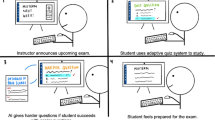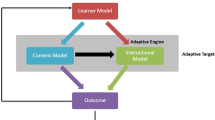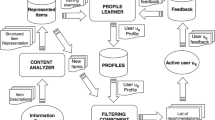Abstract
This approach proposes the creation and management of adaptive learning systems by combining component technology, semantic metadata, and adaptation rules. A component model allows interaction among components that share consistent assumptions about what each provides and each requires of the other. It allows indexing, using, reusing, and coupling of components in different contexts powering adaptation. Our claim is that semantic metadata are required to allow a real reusing and assembling of educational component. Finally, a rule language is used to define strategies to rewrite user query and user model. The former allows searching components developing concepts not appearing in the user query but related with user goals, whereas the last allow inferring user knowledge that is not explicit in user model.
Similar content being viewed by others
References
S. Alexaki, V. Christophides, G. Karvounarakis, D. Plexousakis, and K. Tolle “The ICS-FORTH RDFSuite: Managing voluminous RDF description bases,” in 2nd International Workshop on the Semantic Web (SemWeb’01), 2001.
E. Baralis and J. Widom “An algebraic approach to static analysis of active database rules,” ACM Transaction on Database System, Vol. 25, No. 3, 2000.
A. Bouzeghoub, C. Carpentier, B. Defude, and F. Duitama “A model of reusable educational component for the generation of adaptive courses,” in Proc. of the First international Workshop on Semantic Web for Web-based Learning, Austria, 2003.
P. Brusilovsky “Methods and techniques of adaptive hypermedia,” User Modeling and User Adapted Interaction, Vol. 6, Nos. 2/3, pp. 87–129, 1996.
M. Crampes and S. Ranwez “Ontology-supported and ontology-driven conceptual navigation on the World Wide Web,” in Proceedings of the Eleventh ACM on Hypertext and hypermedia, Texas, 2000, pp. 191–199.
A. El Saddik, S. Fischer, and R. Steinmetz “Reusability and adaptability of interactive resources in Web-based educational,” ACM Journal of Educational Resources in Computing, Vol. 1. No. 1, 2001.
D. Fischer “From Thesauri towards ontologies?” in Proceedings 5th Int. ISKO-Conference, France, 1998 pp. 18–30.
IEEE “Draft standard for learning object metadata,” IEEE P1484.12.1., 2002. Available from 〈http://ltsc.ieee.org/〉
W. Mann and S. Thomson “Rhetorical structure theory: A theory of text organization,” Technical Report RS-87-190, Information Science Institute, 1987.
S. Ranwez, T. Leidig, and M. Crampes “Pedagogical ontology and teaching strategies: A new formalization to improve life-long learning,” Journal of Interactive Learning Research, Vol. 11, Nos. 3/4, 2000.
G. Weber and M. Specht “User modeling and adaptive navigation support in www-based tutoring,” in Proceedings of the sixth International Conference on User Modeling. Vienna, Italy, 1997, pp. 289–300.
H. Wu, E. De Kort, and P. De Bra “Design issues for general-purpose adaptive hypermedia systems,” in Proceedings of the ACM Conference on Hypertext and Hypermedia, Denmark, 2001, pp. 141–150.
Author information
Authors and Affiliations
Corresponding author
Additional information
John Freddy Duitama received his M.Sc. degree in system engineering from the University of Antioquia -Colombia (South America). He is currently a doctoral candidate in the GET – Institut National des Télécommunications, Evry France. This work is sponsored by the University of Antioquia, where he is assistant professor.
His research interest includes semantic web and web-based learning systems, educational metadata and learning objects.
Bruno Defude received his Ph.D. in Computer Science from the University of Grenoble (I.N.P.G) in 1986. He is currently Professor in the Department of Computer Science at the GET - Institut National des Télécommunications, Evry France where he leads the SIMBAD project (Semantic Interoperability for MoBile and ADaptive applications).
His major field of research interest is databases and semantic web, specifically personalized data access, adaptive systems, metadata, interoperability and semantic Peer-to-peer systems with elearning as a privileged application area.
He is a member of ACM SIGMOD.
Amel Bouzeghoub received a degree of Ph.D. in Computer Sciences at Pierre et Marie Curie University, France.
In 2000, she joined the Computer Sciences Department of GET-INT (Institut National des Telecommunications) at Evry (France) as an associate professor.
Her research interests include topics related to Web-based Learning Systems, Semantic Metadata for learning resources, Adaptive Learning Systems and Intelligent Tutoring Systems.
Claire Lecocq received an Engineer Degree and a Ph.D. in Computer Sciences respectively in 1994 and 1999. In 1997, she joined the Computer Sciences Department at GET-INT (Institut National des Télécommunications) of Evry, France, as an associate professor. Her first research interests included spatial databases and visual query languages. She is now working on adaptive learning systems, particularly on semantic metadata and user models.
Rights and permissions
About this article
Cite this article
Duitama, F., Defude, B., Bouzeghoub, A. et al. A Framework for the Generation of Adaptive Courses Based on Semantic Metadata. Multimed Tools Appl 25, 377–390 (2005). https://doi.org/10.1007/s11042-005-6541-8
Issue Date:
DOI: https://doi.org/10.1007/s11042-005-6541-8




